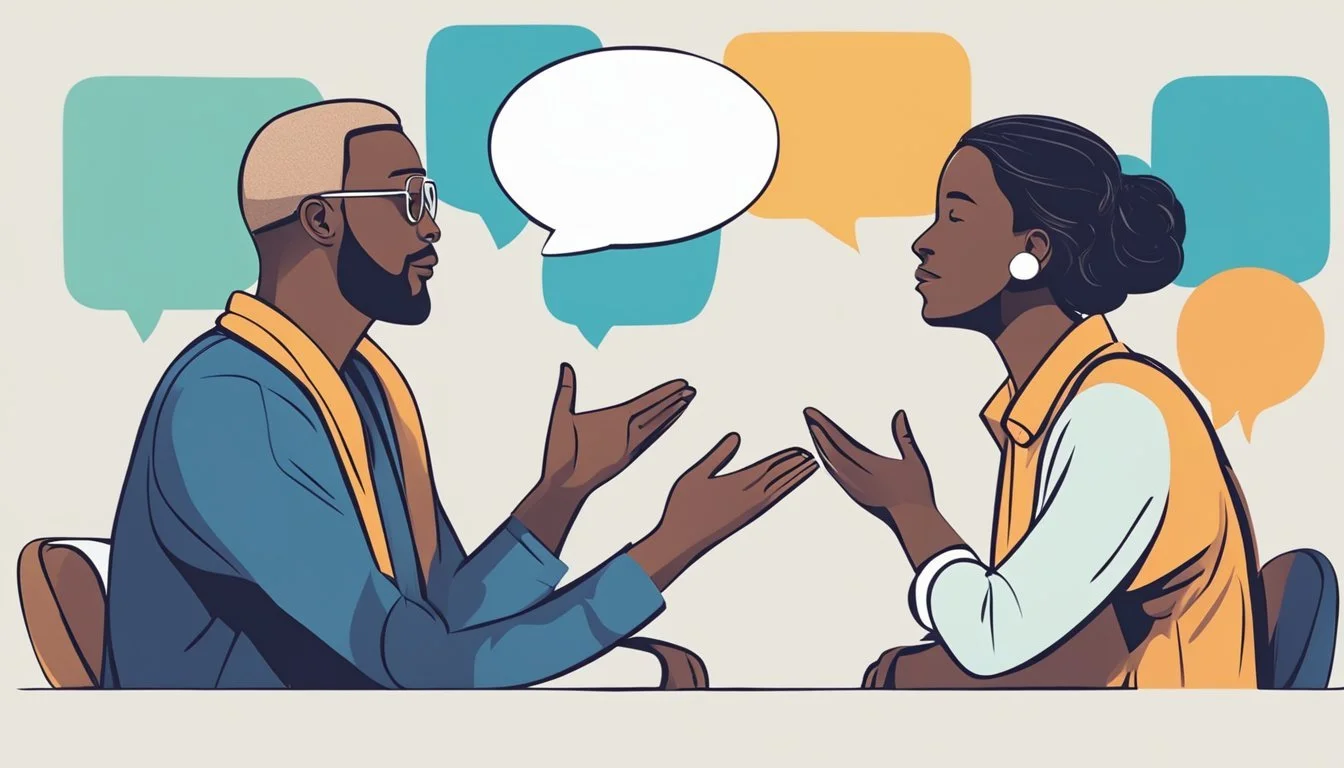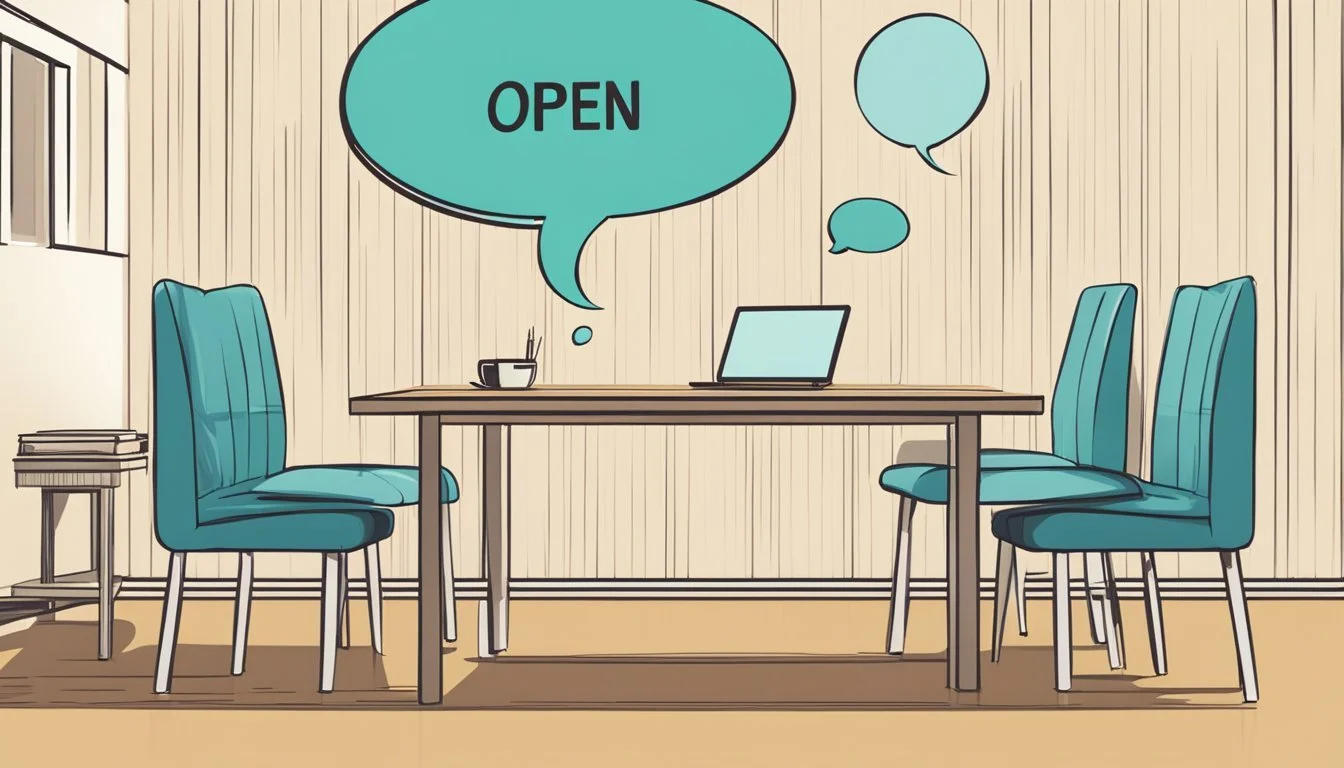15 Signs Your Partner is Committed to Open Communication
Key Indicators for a Healthy Relationship
Open communication is a cornerstone of any strong relationship. It allows partners to discuss their feelings, needs, and aspirations without fear of judgment, fostering a deeper connection and mutual respect. Effective communication can help couples navigate challenges together, creating a more harmonious partnership.
Understanding the signs of commitment to open communication can provide valuable insights into the health and future of a relationship. Recognizing these signs can help individuals feel more secure and valued. It can also highlight areas that may need improvement to ensure both partners feel heard and understood.
1) They express their feelings clearly
A partner committed to open communication will express their feelings clearly. Clear expression of emotions helps avoid misunderstandings and fosters a deeper connection.
They use straightforward language when discussing their emotions. This leaves little room for ambiguity.
Additionally, they actively engage in conversations about their feelings. They don't shy away from discussing emotions, even if the topic is uncomfortable.
Such partners also encourage reciprocal openness. They create a safe space for their partner to share emotions freely.
Being able to clearly express emotions is key in understanding each other's needs. This enhances mutual support within the relationship.
Moreover, expressing feelings clearly helps build trust. It shows that each partner values honesty and transparency.
2) They Ask for Your Opinion Often
When your partner frequently seeks your opinion, it shows a deep respect for your thoughts and feelings. This habit reflects their commitment to creating a balanced relationship where both voices are heard.
Regularly asking for your input also demonstrates that they value your perspective. Whether it’s about daily decisions or significant life choices, this practice fosters mutual respect and understanding.
By involving you in discussions and decision-making processes, they signal that your views are essential. This can significantly enhance emotional intimacy and trust.
Frequent requests for your opinion can also help in resolving conflicts more effectively. It creates a habit of open dialogue, making both partners feel more connected and aligned in their relationship goals.
Consistently asking for your opinion isn’t just about seeking advice. It’s also a way to ensure that both partners are on the same page, promoting a healthier and more communicative relationship.
Clear communication lays the foundation for trust and intimacy in any relationship. Your partner’s habit of asking for your views is a critical aspect of this.
3) They Listen Actively Without Interrupting
Active listening is a key indicator of commitment to open communication. It involves giving full attention to the speaker without interruptions. Your partner maintains eye contact and responds with non-verbal cues that indicate understanding and engagement.
They pause to consider your words before formulating a response. This thoughtful approach shows their dedication to genuinely understanding your perspective. When they do respond, it's clear their reply is based on careful consideration of what was said.
Summarizing what you've conveyed, like saying "It sounds like you feel unsupported when I don't help with chores," demonstrates their effort to accurately capture your feelings. This technique confirms that they are not just hearing your words, but comprehending the underlying emotions and concerns.
By not interrupting, your partner reduces the chance of miscommunication and misunderstandings. They prioritize ensuring that conversations are productive and affirming. This behavior fosters a deeper connection and builds a foundation of trust and respect.
Active listening without interruptions is a hallmark of healthy, open communication in relationships. It showcases a partner's dedication to resolving conflicts and understanding their significant other's point of view, creating a supportive environment for dialogue.
4) They Validate Your Perspective
When a partner validates your perspective, they acknowledge and respect your feelings and thoughts. This behavior shows a willingness to understand your emotional experience.
Validating your perspective involves active listening. They focus on what you are saying without interrupting, making you feel heard and valued. This helps build trust and connection in the relationship.
It’s not just about agreement. Even if they don’t share the same view, they recognize the legitimacy of your feelings. This approach reduces conflict and enhances mutual respect.
Empathy plays a key role in validation. By expressing empathy, your partner shows they care about your emotional well-being. This deepens intimacy and fosters a supportive environment.
Active engagement in conversations, where they demonstrate genuine interest and reflect on your feelings, strengthens the emotional bond. They may ask clarifying questions to show they are fully engaged.
For practical tips on validating your partner’s feelings, check Power of Positivity.
5) They use 'I' statements to share their feelings
Using 'I' statements is a key sign of commitment to open communication in a relationship. 'I' statements focus on the speaker's own feelings, thoughts, and experiences, which helps to reduce defensiveness in conversations.
When someone says "I feel" instead of "You make me feel," it emphasizes personal emotions rather than placing blame. This method can foster a more understanding environment and encourage empathy from the partner.
'I' statements can look like "I feel sad when plans change suddenly" or "I get frustrated when there's a lack of communication." These statements invite discussion and problem-solving, rather than confrontation.
This approach helps partners express their emotions without triggering defensive responses. It's about sharing how situations affect them personally, rather than accusing or criticizing the other person.
To effectively use 'I' statements, it's important to focus on specific feelings and avoid ambiguous terms. For example, saying, "I feel worried when I don't hear from you," is clearer and more constructive than vague complaints.
According to experts, 'I' statements can improve communication, increase trust, and lead to stronger relationships. They create a platform for mutual respect and understanding, paving the way for healthier, more open interactions.
In summary, by using 'I' statements, partners show a willingness to communicate openly and resolve issues collaboratively. This technique reinforces a positive communication pattern and demonstrates a high level of commitment to the relationship. For more information, check out how to use 'I' statements.
6) They Initiate Difficult Conversations
A partner who values open communication will not shy away from tough topics. They understand that addressing challenging issues head-on is necessary for a healthy relationship. Whether the subject is financial concerns or personal values, they show courage and empathy by bringing these matters to the forefront.
Initiating difficult conversations demonstrates a commitment to resolving conflicts constructively. It shows they are willing to face discomfort for the sake of growth and clarity. This behavior fosters trust and deepens the bond between partners.
They also recognize the importance of timing and approach. Setting aside a specific time for such discussions ensures both partners are prepared. This minimizes misunderstandings and allows for a more thoughtful exchange.
Furthermore, they strive to stay calm and collected. They avoid starting such conversations when emotions are running high. This ensures that the dialogue remains respectful and productive, allowing both partners to express their views without feeling attacked.
By taking the initiative to discuss difficult subjects, they reinforce their dedication to maintaining a transparent and honest relationship. This proactive approach is a clear sign of their commitment to better communication.
7) They Seek Mutual Understanding
A partner committed to open communication values mutual understanding. This means they actively listen and aim to fully grasp their partner’s perspective.
They take steps to clarify any misunderstandings. This can include asking questions to ensure they accurately interpret their partner's feelings and thoughts.
It's also common for them to reflect back what they’ve heard. This helps confirm they understand correctly.
Taking time to discuss issues calmly and respectfully further shows their dedication. They’re willing to compromise and find solutions that benefit both partners.
They encourage their partner to share openly. Creating a safe space for dialogue is crucial in their approach.
They recognize the importance of emotional support. This support often strengthens the bond in the relationship.
This dedication to mutual understanding helps build trust. Over time, it nurtures a more harmonious and connected partnership. For more insights, see fostering mutual understanding with your partner.
8) They are honest about their needs
A partner committed to open communication is transparent about their needs. They don't shy away from expressing what they require emotionally, physically, or mentally. Being upfront reduces misunderstandings.
Honesty about needs fosters trust. When one partner shares their desires and boundaries clearly, it sets a precedent. Both parties feel more secure knowing exactly where they stand.
This honesty also includes discussing discomforts. If something in the relationship isn't working, they speak up. Addressing issues head-on prevents resentment from building up.
For example, a partner might express needing more quality time together. Instead of keeping feelings bottled up, they clearly state their expectations. This encourages a cooperative approach to meeting each other's needs.
Another sign is when they also respect your needs. They listen and integrate your requirements into daily interactions. Mutual respect for each other's needs builds a balanced relationship.
A committed partner reassures and adjusts as necessary. They remain flexible, showing that your combined satisfaction is a priority.
9) They Encourage You to Share Your Thoughts
A partner committed to open communication values your perspective. They actively create opportunities for you to express your ideas, feelings, and opinions. This can manifest in simple daily conversations or during meaningful discussions.
They listen attentively without interrupting, ensuring you feel heard and understood. This behavior demonstrates respect and promotes a safe environment for sharing.
They may also ask open-ended questions that require more than a yes or no answer. Questions like "How do you feel about this?" or "Can you tell me more about your thoughts?" help deepen the conversation.
Encouraging you to share your thoughts also involves showing genuine interest in what you say. They remember details from previous conversations and bring them up later, showing that they value your input.
They support your need to communicate by being attentive and responsive. This fosters trust and strengthens the emotional bond between you both.
A supportive partner can also help you process your feelings and thoughts by providing feedback when needed, without making you feel judged or criticized. This helps build emotional intimacy and connection.
In essence, this encouragement reflects a deep commitment to maintaining a healthy, open line of communication in the relationship.
10) They Follow Up on Previous Discussions
A reliable sign of a partner's commitment to open communication is that they follow up on earlier conversations. This behavior indicates that they not only listen attentively but also care about what was discussed.
When a partner brings up a past topic, it shows they value the discussion and are invested in resolving any issues. This helps build trust and demonstrates a proactive approach.
Following up allows for progress in the relationship, ensuring that concerns are addressed. It also shows that they are seeking mutual understanding and are committed to improving the relationship together.
This behavior fosters a sense of continuity and consistency, crucial for a stable partnership. It underscores the importance they place on maintaining a strong and open line of communication.
11) They Apologize When They're Wrong
A committed partner recognizes their mistakes and expresses genuine remorse. Apologizing demonstrates maturity and a willingness to address issues constructively. This behavior promotes trust and strengthens the relationship.
Apologies are not just about saying "sorry." They involve acknowledging the mistake and understanding its impact. This depth of contrition shows respect and empathy for their partner's feelings.
Frequent, sincere apologies indicate that the partner values the relationship and is committed to its health. This willingness to admit fault fosters a secure environment where both partners feel safe to express themselves.
A partner who can apologize contributes significantly to open communication. Admitting wrongdoings and taking responsibility are essential for resolving conflicts. This transparency leads to a more harmonious partnership.
Partners who apologize engage in meaningful dialogue, which is crucial for mutual understanding. This practice lays the groundwork for long-term trust and resilience in the relationship.
For more on commitment, see these green flags in a relationship.
12) They Avoid Making Assumptions
A partner committed to open communication avoids jumping to conclusions. Making assumptions can lead to misunderstandings and unnecessary conflict in a relationship. Instead, they prioritize clarity.
They ask open-ended questions to understand their partner's feelings and thoughts. This habit helps in avoiding miscommunication and ensures that both partners are on the same page.
By not assuming they know what their partner wants or needs, they create an environment of trust. This approach prevents the frustration that comes from unmet expectations and fosters a more profound connection.
Practicing this level of engagement shows their dedication to maintaining a healthy dialogue. Open communication is the foundation of a strong relationship, and avoiding assumptions is a crucial part of it.
For more information on avoiding assumptions, check out this guide.
13) They Set Aside Time to Talk
A key sign that your partner is committed to open communication is when they set aside specific times to talk. This practice shows they value the relationship and want to ensure both partners have a chance to express their thoughts and feelings.
Making a plan to speak, as suggested in an article about communication rules, can prevent misunderstandings. It's not about talking whenever, but finding a time when both can focus.
This intentional approach provides a structured environment for important discussions. It helps avoid initiating conversations when emotions are running high, which can lead to unproductive arguments. Instead, it allows both partners to articulate their views calmly and clearly.
14) They use active listening techniques
Active listening is a crucial component of effective communication. A partner committed to open communication employs techniques like reflecting, asking open-ended questions, and seeking clarification.
These techniques help ensure they truly understand the conversation. Reflecting involves paraphrasing what the other person has said to confirm comprehension. Asking open-ended questions encourages detailed responses rather than simple yes-or-no answers.
Seeking clarification involves asking for more information when something isn't clear. This approach prevents misunderstandings and demonstrates genuine interest in their partner’s thoughts and feelings. Another key aspect is observing body language. Non-verbal cues can provide valuable insights into unspoken emotions and support effective communication.
Additionally, practicing mindful listening can improve focus. By setting aside distractions and fully engaging with their partner, they show respect and a desire to understand. Mindful listening can be practiced anytime by concentrating on the here and now and letting go of judgments.
In relationships, empathy is also essential. Empathic listening allows one to understand their partner's perspective deeply. This helps in addressing concerns and building a stronger emotional connection. By utilizing these active listening techniques, partners demonstrate their dedication to maintaining a healthy and communicative relationship.
15) They stay calm during disagreements
Staying calm during disagreements showcases a partner’s commitment to open communication. When emotions run high, maintaining composure helps prevent conflicts from escalating.
Techniques such as deep breathing and taking short breaks can aid in staying calm. These practices enhance emotional resilience, contributing to healthier interactions.
Listening actively is crucial. By genuinely attempting to understand the partner’s perspective, the discussion remains productive and empathetic.
Using mindfulness can also be beneficial. It keeps the focus on the present moment, reducing the likelihood of reacting impulsively.
Calmness during conflicts signals respect and a desire to resolve issues amicably.
The Importance of Open Communication in Relationships
Open communication is essential for cultivating trust and strengthening emotional connections. It allows partners to express their thoughts, needs, and feelings openly.
Building Trust Through Communication
Trust is the cornerstone of any healthy relationship. Open communication helps build trust because it ensures that both partners feel heard and understood. This transparency means that people can share their joys, concerns, and even fears without fearing judgment or rejection.
For example, discussing daily activities and significant issues alike creates a supportive environment in which neither partner feels left out or neglected. Consistently sharing information helps to foster a sense of reliability and predictability. By being honest about their intentions and actions, partners reinforce their commitment to each other.
Open communication in a relationship also means involving each other in decision-making processes. When both parties feel included, they are more likely to trust one another’s judgment and perspective. This mutual respect and involvement build a solid foundation for the relationship.
Strengthening Emotional Bonds
Emotional connection thrives on open communication. By sharing personal experiences and feelings, partners can deepen their understanding of each other. This practice helps in creating emotional intimacy, which is vital for long-term relationship satisfaction.
By talking about each other’s needs and expectations clearly, partners can avoid potential misunderstandings and conflicts. This clarity prevents resentment from building up over time, which can erode emotional bonds.
Additionally, regular check-ins about how each other feels reinforce the emotional commitment. Setting aside time to speak openly and honestly ensures that each partner feels valued and appreciated. This dedicated time emphasizes the importance of the relationship, further solidifying the emotional connection.
Being a good listener is equally important in strengthening emotional bonds. Active listening shows that one cares about the other’s feelings and thoughts, which fosters a sense of being supported and loved.
How to Encourage Your Partner to Communicate Openly
Creating an environment where your partner feels comfortable expressing themselves can significantly enhance communication. Key strategies include fostering a supportive atmosphere and utilizing active listening.
Creating a Safe Space for Expression
To encourage open dialogue, it's essential to create a space where your partner feels secure and respected. Start by showing empathy and understanding, validating their feelings without judgment.
Eliminate distractions during conversations. Turn off devices and give full attention, focusing entirely on your partner. Maintain a calm composure, especially during difficult discussions. Avoid interrupting, and let your partner finish their thoughts.
Praise their willingness to share openly. Affirm their emotions and reassure them that their perspectives are valued. Foster a non-judgmental attitude to ensure they feel safe to speak candidly.
Active Listening Techniques
Active listening is crucial for promoting open communication. It involves fully concentrating, understanding, responding, and remembering what your partner says. Start by maintaining eye contact, nodding, and using affirmations like "I see," and "Go on."
Reflect on what you hear by paraphrasing their statements. For instance, if your partner says they feel stressed, respond with, "It sounds like work has been overwhelming for you lately." This shows that you're genuinely engaged and empathetic.
Ask open-ended questions to encourage further discussion. Questions like "How did that make you feel?" invite more detailed responses. Echoing feelings expressed can also be helpful. Statements such as "You seem frustrated," validate their emotions and demonstrate that you're attuned to their needs.
Addressing Communication Barriers
Understanding the common hurdles in communication and employing effective strategies can greatly enhance openness between partners. Addressing these barriers is essential for fostering healthier and more transparent interactions.
Identifying Common Barriers
Several common barriers often impede open communication in relationships. Emotional reactions such as anger or sadness can block effective dialogue. When emotions run high, it is challenging to have a constructive conversation.
Differences in communication styles can also create misunderstandings. One partner may prefer direct talk, while the other leans on indirect hints. This mismatch often results in misinterpretation.
Fear of vulnerability is another significant barrier. People might hesitate to share deeply personal thoughts due to fear of judgment or rejection. This can create an emotional disconnect over time and hinder honest discussions.
Strategies for Overcoming Obstacles
To combat these barriers, utilizing practical strategies is key. Encourage partners to practice active listening, which involves paying full attention and acknowledging the other person’s perspective. This helps in reducing emotional defensiveness.
Setting aside designated times for important conversations can also be beneficial. Choosing a calm and private setting minimizes distractions and promotes openness. This is especially useful for complex or sensitive topics.
Cultural competency is another important strategy. Understanding and respecting differences in communication styles and cultural backgrounds aids in bridging gaps. Partners should educate themselves about each other’s background and preferences.
Using "I" statements instead of "You" statements can reduce feelings of accusation. For example, saying “I feel worried when…” instead of “You never…” shifts the focus to personal feelings, making it easier for the partner to empathize and respond positively.









